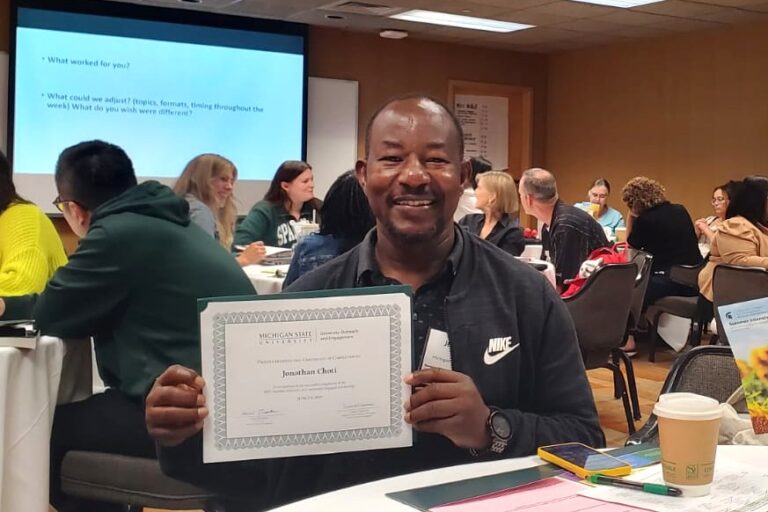After nearly 40 years of service to Michigan State University, Professor of German and former Dean of the College of Arts & Letters, Karin A. Wurst, has retired. Her career reflects a legacy of scholarship, leadership, and innovation in the humanities.

Wurst first came to MSU in 1988, joining the Department of Linguistics, Languages, and Cultures as a tenure-track faculty member in German Studies. She quickly distinguished herself as a scholar of 18th- and 19th-century German literature and culture, publishing widely on figures such as Gotthold Ephraim Lessing and J.M.R. Lenz, as well as on cultural history topics like fashion, entertainment, and consumption during the Classical and Romantic periods.
By 1998, she was promoted to full professor, and her influence in both teaching and research was well established.
In 2006, she was appointed Dean of the College of Arts & Letters, a role she held for two terms until 2014.
Leadership as Dean
During her tenure as Dean of the College of Arts & Letters, Wurst demonstrated a forward-looking vision that emphasized innovation, collaboration, and student success.
She oversaw the launch of the Creativity Exploratory, an experimental think tank and maker space where students could pursue creative projects across disciplines, and she championed the creation of the Center for Language Teaching Advancement (CeLTA), which has since become a national leader in language pedagogy and research. She encouraged the creation of new degrees, such as Experience Architecture, and new initiatives in experiential learning.

Bethany Judge, formerly of the Undergraduate Division in the College of Arts & Letters, now Director of Experiential Learning in the Office of the Provost, said that “the time and attention she paid to the importance of experiential learning, critical thinking, and creative problem solving will echo through generations of our students.”
Wurst’s colleagues recall her deanship as a period of transformation. Senta Goertler, Professor of German and a longtime collaborator, described her as a “great advocate” whose leadership combined vision with humility.
“The time and attention she paid to the importance of experiential learning, critical thinking, and creative problem solving will echo through generations of our students.”
Bethany Judge, Director of Experiential Learning, Office of the Provost
“She does not do it for the glory or the money or to make others happy,” Goertler said. “She leads with integrity and a commitment to innovation and transformation.”
Wurst’s foresight was particularly evident in her investment in digital humanities and online education long before these became widespread. In 2007, she initiated a cluster hire in languages to expand online learning, improve access, and build institutional expertise. Those hires positioned MSU as a leader and later proved invaluable during the pivot to remote teaching in 2020.

“The initiative on technology and online teaching, with the hiring of a technology director in the College of Arts & Letters and a cluster hire in online teaching in a first-adopter department during my first term, placed us in the forefront of online teaching, especially in foreign languages,” Wurst said. “This served us well later during the pandemic, when many structures were already in place and could be adapted across the college and nationally.”
“Karin’s unwavering support for language education is prescient. It not only impacted her students but her students’ students and, in turn, also the campus and the larger community.”
Angelika Kraemer, former Director of CeLTA
Angelika Kraemer, former Director of CeLTA, recalled how Wurst’s innovation stretched back even earlier, to her support of community-based language education. In 2004, Wurst helped launch the Reach program, which began as short German language lessons in local elementary schools and eventually grew into the MSU Community Language School.
“Karin’s unwavering support for language education is prescient,” Kraemer said. “It not only impacted her students but her students’ students and, in turn, also the campus and the larger community.”
A Legacy of Mentorship
Beyond her administrative achievements, Wurst is recognized nationally for her dedication to graduate education and mentoring. She was twice Chair of MSU’s Council of Graduate Students and worked to reshape graduate training in the humanities to better prepare students for diverse career paths.

Under her leadership, MSU’s German graduate program was among the first in the nation to redesign its curriculum for multiple career outcomes, producing alums who now serve in higher education, corporate leadership, government, and the nonprofit sector.
Her mentorship extended well beyond her own department. As colleagues noted, Wurst often encouraged young scholars to pursue ambitious projects, supported interdisciplinary collaborations, and modeled a balance of intellectual rigor and administrative acumen.
“What I have always appreciated most in Karin is her vision, persistent quiet advocacy for young scholars, and humility. I, the German program, and the College of Arts & Letters would not be who we are and where we are today without Karin’s vision and investments.”
Senta Goertler, Professor of German
“What I have always appreciated most in Karin is her vision, persistent quiet advocacy for young scholars, and humility,” Goertler said. “I, the German program, and the College of Arts & Letters would not be who we are and where we are today without Karin’s vision and investments.”
After stepping down as Dean in 2014, Wurst continued to make significant contributions to Michigan State University. She served as Advisor to the Provost for Intercultural Learning and Engagement. In that role, she advanced efforts to broaden student opportunities for global learning and cultural exchange. She also remained an active faculty member in the German program by researching, teaching, advising, and supporting student career preparation until her retirement.
Scholar and Innovator
Raised and educated in Germany, Wurst earned her Staatsexamen in both English and German Literature and Linguistics at the University of Tübingen before completing her Ph.D. in German Studies at Ohio State University in 1985.
Throughout her career, she maintained a vibrant research agenda, authoring influential books and essays that expanded the study of 18th-century German literature and culture. Her scholarship bridged literary studies with questions of visual culture, consumption, and identity, helping to shape new directions in the field. She also co-edited volumes and mentored graduate students in projects that bridged traditional scholarship with emerging fields, such as digital humanities.



Her scholarly curiosity was driven, as she once wrote on her website, by a fascination with “how change happens — be it change from one cultural or political paradigm to another in my research and scholarship, in the formation of perceptions and changes in attitudes in teaching and leadership practices, or in the development of the self through life-long learning.”
Lasting Impact
The testimonials from colleagues highlight Wurst’s professional accomplishments and her personal impact. Kraemer noted that Wurst’s vision for languages at MSU elevated the role of language education across the university. Goertler emphasized that her strategic decisions laid the groundwork for programs like Digital Humanities and Experience Architecture, which have become widely recognized. Judge noted that her dedication to students, their learning and experiences, and to thinking outside the box on how best to do that, set new directions in undergraduate affairs.

“As Dean, I focused not only on supporting faculty research but also on creating innovative programs that enhanced the student experience and, importantly, their potential employability,” Wurst said. “For example, the multidisciplinary degree in Experience Architecture — a combination of professional writing, design, and programming — created wonderful pathways to attractive employment for our undergraduates. It also boosted recruitment, employment statistics, and salary averages for new graduates of the college.”
“As Dean, I focused not only on supporting faculty research but also on creating innovative programs that enhanced the student experience and, importantly, their potential employability.”
Dr. Karin Wurst
As Wurst enters retirement, she does so with a career defined by transformation: of programs, of graduate education, and of opportunities for students and faculty alike. From her beginnings as a young scholar at Ohio State, to her decades of teaching and leadership at MSU, to her role in shaping the future of language education at MSU and nationally, her legacy is one of vision and perseverance.
Wurst has said that she relished her position as Dean because it not only allowed her to work with faculty and students but also the wonderful friends of the College of Arts & Letters, alumni, and donors, and most of all, it provided “a bigger platform for innovation and change.” Those innovations continue to shape the College of Arts & Letters today.

In the words of Kraemer, reflecting on more than two decades of collaboration: “Thanks to her leadership and vision, languages found their joint home in the Wells Hall addition, and I think MSU and the language community certainly has had an elevated role because of all of the dedication that she gave.”
Goetler also expressed her gratitude: “I am forever grateful for her leadership and advocacy, and hope that we can be good stewards of her legacies while she enjoys her well-deserved retirement. Mein allerherzlichstes Dankeschön, Karin. Ich wünsche dir gute Gesundheit, viel Freude und auch Ruhe in diesem neuen Lebensabschnitt. Thank you, Karin.”
Wurst officially retired on Aug. 15, 2025. A celebration in her honor, hosted by the Department of Linguistics, Languages, and Cultures, was held on April 30, 2025.


